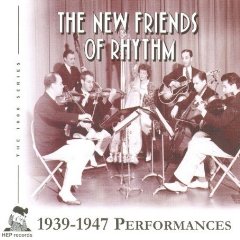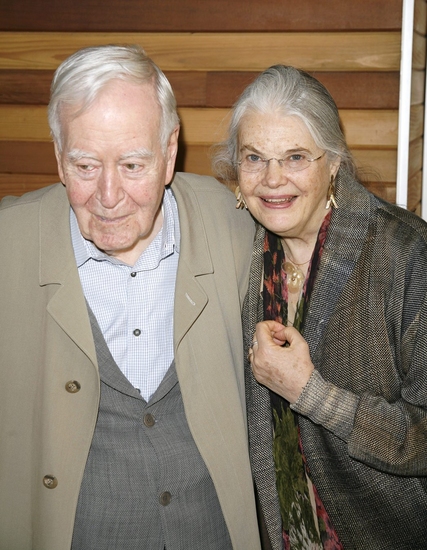“I don’t care for success. The ideas sitting in my head are annoyed by, and envious of, that which I’ve already written.”
Anton Chekhov, letter to A.S. Suvorin (Oct. 27, 1888)
Archives for June 2009
TT: Summit meeting
 Most jazz musicians have had at least some experience playing classical music, but it’s unusual for them to record it. When they do, it tends to be in the form of the jazzing-the-classics adaptations that I wrote about in a 2007 “Sightings” column for The Wall Street Journal occasioned by the first reissue of the rare 78s of a wonderful little combo called the New Friends of Rhythm:
Most jazz musicians have had at least some experience playing classical music, but it’s unusual for them to record it. When they do, it tends to be in the form of the jazzing-the-classics adaptations that I wrote about in a 2007 “Sightings” column for The Wall Street Journal occasioned by the first reissue of the rare 78s of a wonderful little combo called the New Friends of Rhythm:
The New Friends of Rhythm was an instrumental septet led by Alan Shulman, a cellist and composer who was a charter member of Arturo Toscanini’s NBC Symphony. It consisted of a harpist, a string quartet and a jazz rhythm section, and it played very hip arrangements of well-known pieces of classical music to which Shulman affixed such zany titles as “Bach Bay Blues” and “Shoot the Schubert to Me, Hubert.” The group’s records were so successful that in 1940 it got written up in Time, which revealed that its members were known at NBC as “Toscanini’s hep cats.”
In those days, of course, the classics got jazzed on a regular basis. Some of the most popular songs of the ’30s and ’40s, including “The Lamp Is Low” and “My Reverie,” were based on such classical compositions as Ravel’s “Pavane for a Dead Princess” and Debussy’s “Rêverie.” The practice became so common that Ayn Rand, whose virtues are not known to have included a sense of humor, took a shot at it in Atlas Shrugged, in which she grumpily described an imaginary pop record based on a piano concerto by a fictional composer named Richard Halley: “It was as if a handful of mud and pebbles had been flung at the music, and what followed was the sound of the rolling and the dripping….It was Halley’s melody torn apart, its holes stuffed with hiccoughs. The great statement of joy had become the giggling of a barroom.”
The real-life record Rand undoubtedly had in mind was Freddy Martin’s “Concerto in B Flat,” based on the first movement of the Tchaikovsky B-Flat Minor Piano Concerto, which was one of the biggest sellers of 1941. It is, if truth be told, pretty sappy. But when bona fide jazz musicians reworked the classics, the results could be delightful. Art Tatum’s dapper stride-piano version of Dvorak’s “Humoresque” (which you can see him playing on YouTube) is as elegant as a tightly rolled umbrella, while the King Cole Trio’s recording of Rachmaninoff’s Prelude in C-Sharp Minor is one of the most ingenious jazz arrangements of a classic ever to be committed to disc….
“Humoresque,” needless to say, wasn’t Tatum’s only recorded excursion into the classics, and I’d heard for years that on occasion he even played Chopin. In 2006 Storyville Records confirmed the rumor by releasing an album that contained a highly personal reinterpretation of Chopin’s C-Sharp Minor Waltz, Op. 64/2, recorded in a Toronto nightclub in 1949. Now some anonymous benefactor has posted that audio-only track on YouTube, and it proves, not surprisingly, to be a fascinating and treasurable document of Tatum’s style.
Here it is:
TT: Almanac
“Talent is recognizable not only by quality, but also by the quantity it yields.”
Anton Chekhov, letter to P.A. Sergeenko (Mar. 6, 1889)
TT: Somewhere along the way
Mrs. T and I flew to Chicago last week to see Writers’ Theatre’s production of A Minister’s Wife, a musical version of George Bernard Shaw’s Candida by Austin Pendleton, the author of Orson’s Shadow, and Joshua Schmidt, the composer of Adding Machine. (If you go to the show, eat at Prairie Grass Cafe first.) I had a cold when we left New York, Mrs. T caught it the day after we arrived in Chicago, and it was raining throughout most of our two-night stay, so instead of lining up at Hot Doug’s and paying a visit to the new wing of the Art Institute of Chicago, we holed up in a hotel room across the highway from Glencoe, the suburb where Writers’ Theatre is located.
 The sun came out long enough on Friday for us to drive to Ravine Bluffs Development, a Glencoe neighborhood that contains six Frank Lloyd Wright houses built in 1915, all of them beautiful, most in good repair, and two for sale. (The second, alas, is being sold “as is,” meaning that it may be bought for the land and torn down.)
The sun came out long enough on Friday for us to drive to Ravine Bluffs Development, a Glencoe neighborhood that contains six Frank Lloyd Wright houses built in 1915, all of them beautiful, most in good repair, and two for sale. (The second, alas, is being sold “as is,” meaning that it may be bought for the land and torn down.)
We returned to the East Coast the next day and headed in different directions, Mrs. T to Connecticut and I to New York, where I had planned to see Twelfth Night in Central Park. No such luck: Sunday’s performance was rained out, though not before I got soaked to the skin. Tomorrow we meet again, this time to catch Pericles and Much Ado About Nothing at the Hudson Valley Shakespeare Festival, one of our favorite summer stops. Then I fly to the West Coast to see shows in Los Angeles and San Diego and at the Oregon Shakespeare Festival. From there I’ll be on the move more or less continuously until I report to Santa Fe to rehearse The Letter, which opens on July 25.
I get tired just thinking about all those plane rides, though I have something even more horrendous awaiting me in December: I’ll be speaking about Pops on consecutive nights in New York, Los Angeles, Baltimore, and Philadelphia. I’ll also be appearing in Boston, and Houghton Mifflin Harcourt is in the process of scheduling additional speaking trips to New Orleans, St. Louis, and Washington, D.C. Be careful what you ask for!
Now if you’ll excuse me, I’ve got to write a drama column, pick up my laundry, pack a bag, and catch a train. Or is it a plane?
* * *
Here’s a video about Ravine Bluffs:
TT: Almanac
“When a person expends the least amount of motion on one action, that is grace.”
Anton Chekhov, letter to Maxim Gorky (Jan. 3, 1899)
TT: Improving on perfection
I review two shows in today’s Wall Street Journal drama column, the Hartford Stage transfer of Dividing the Estate and the Encores! revival of The Wiz. Here’s an excerpt.
* * *
 You can’t be sure how good a work of art is until you’ve seen it more than once. I saw Horton Foote’s “Dividing the Estate” for the third time last week, and it looked better than ever–though I have no doubt that a good-sized chunk of the credit this time around goes to Lois Smith. Ms. Smith, whose performance in the Signature Theatre Company’s unforgettable 2005 Off-Broadway revival of Foote’s “The Trip to Bountiful” was a high-water mark in my playgoing life, has taken over Elizabeth Ashley’s role in Hartford Stage’s production of “Dividing the Estate,” which is otherwise a straight transfer of the Lincoln Center Theatre staging seen on Broadway last winter. Ms. Ashley is, of course, a tough act to follow, but Ms. Smith does so triumphantly. In fact, she might just be better than her celebrated predecessor–and that’s saying plenty….
You can’t be sure how good a work of art is until you’ve seen it more than once. I saw Horton Foote’s “Dividing the Estate” for the third time last week, and it looked better than ever–though I have no doubt that a good-sized chunk of the credit this time around goes to Lois Smith. Ms. Smith, whose performance in the Signature Theatre Company’s unforgettable 2005 Off-Broadway revival of Foote’s “The Trip to Bountiful” was a high-water mark in my playgoing life, has taken over Elizabeth Ashley’s role in Hartford Stage’s production of “Dividing the Estate,” which is otherwise a straight transfer of the Lincoln Center Theatre staging seen on Broadway last winter. Ms. Ashley is, of course, a tough act to follow, but Ms. Smith does so triumphantly. In fact, she might just be better than her celebrated predecessor–and that’s saying plenty….
It’s been 13 years since Lois Smith last appeared on Broadway (“The Trip to Bountiful” was supposed to transfer there, but no theater was available at the time). That alone is reason enough to go to Hartford to see her. She seasons the role of Stella with a savory pinch of mischief–you can tell that she enjoys toying with her offspring–that heightens the pathos of her character’s imminent rendezvous with death. Her Stella is neither Gothic nor grotesque, merely human, and the relish with which she clings to what remains of her long life is unutterably poignant.
The other members of the ensemble cast have been working together since this production first opened Off Broadway in 2007, yet they show no signs of ennui. If anything, they’ve managed to improve on what I previously thought couldn’t be bettered….
The original Broadway production of “The Wiz,” the 1975 all-black rewrite of “The Wizard of Oz,” ran for 1,672 performances. The 1984 revival closed after two weeks. While I suspect that says all that needs to be said about the modest staying power of “The Wiz,” anyone who cares to see for himself is more than welcome to drop a hundred bucks on Encores! Summer Stars’ production. The singing is terrific, but the songs sound like bonus tracks from “Great TV Themes of the ’70s,” and Andy Blankenbuehler’s busy but aimless dances never seem to go anywhere….
* * *
Read the whole thing here.
TT: Almanac
“Tastes differ so widely, and some people are so humorless, so uncharitable, and so absurdly wrong-headed, that one would probably do far better to relax and enjoy life than worry oneself to death trying to instruct or entertain a public which will only despise one’s efforts, or at least feel no gratitude for them. Most readers know nothing about literature–many regard it with contempt. Lowbrows find everything heavy-going that isn’t completely low-brow. Highbrows reject everything as vulgar that isn’t a mass of archaisms. Some only like the classics, others only their own works. Some are so grimly serious that they disapprove of all humor, others so half-witted that they can’t stand wit. Some are so literal-minded that the slightest hint of irony affects them as water affects a sufferer from hydrophobia. Others come to different conclusions every time they stand up or sit down. Then there is the alcoholic school of critics, who sit in public houses, pronouncing ‘ex cathedra’ verdicts of condemnation, just as they think fit. They seize upon your publications, as a wrestler seizes upon his opponent’s hair, and use them to drag you down, while they themselves remain quite invulnerable because their barren pates are completely bald–so there’s nothing for you to get hold of.”
Sir Thomas More, Utopia (courtesy of Einar Sunde)
TT: Big break
 I’ve been writing with steadily growing enthusiasm about Kate Whoriskey ever since 2005, when Washington’s Shakespeare Theatre invited her to stage The Tempest:
I’ve been writing with steadily growing enthusiasm about Kate Whoriskey ever since 2005, when Washington’s Shakespeare Theatre invited her to stage The Tempest:
Kate Whoriskey, the director, may fancy herself a purveyor of ideas, but in fact she’s something infinitely more precious–a natural-born stage magician….This “Tempest” is clearly the work of a youngish director (she’s 34) who has yet to learn the lesson of economy. But it doesn’t matter, since she nails together all the elements of what looks to me like a very expensive production with an absolute assurance that would be enviable in an old pro and is downright astonishing in a new face.
More recently, Whoriskey directed the production of Lynn Nottage’s Ruined currently playing at New York’s City Center, on which occasion I called her “a director of extraordinary talent whose work deserves to be seen far more often in New York.” I still think so, but now it looks like I’ll have to fly to the West Coast to see what she’s up to: Seattle’s Intiman Theatre just announced that starting in 2010, Whoriskey will become its next artistic director, replacing the much-admired Bartlett Sher.
This is very big news for a very important regional theater, and as far as I’m concerned it’s 100% good. I can’t wait to see what Whoriskey does with Intiman. My congratulations to an immensely promising young artist.
